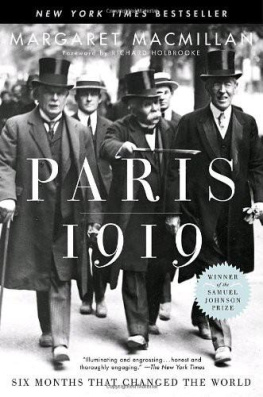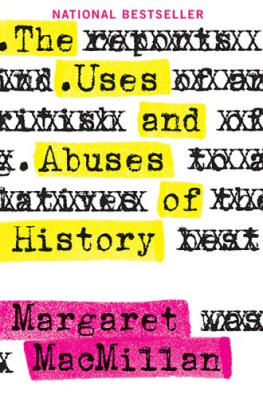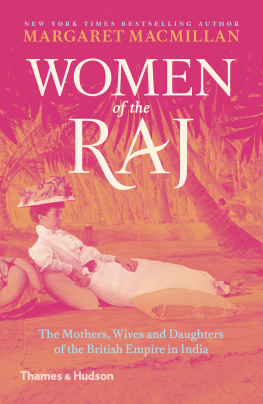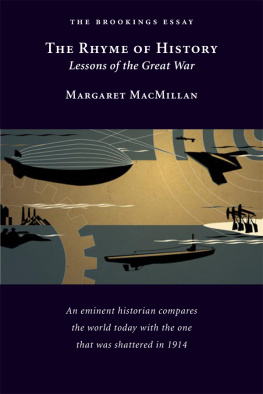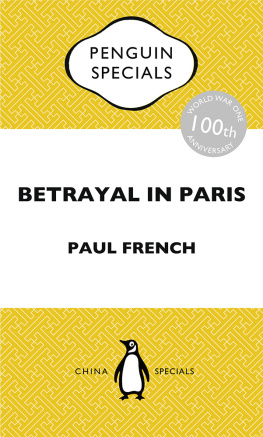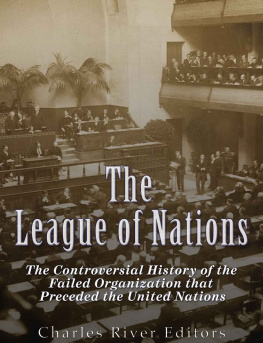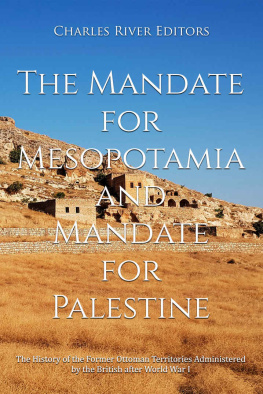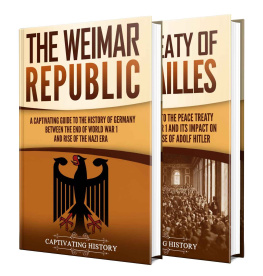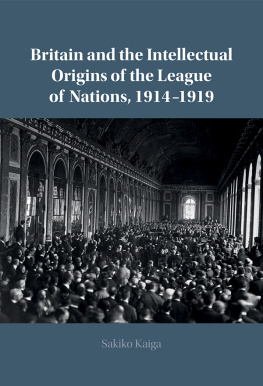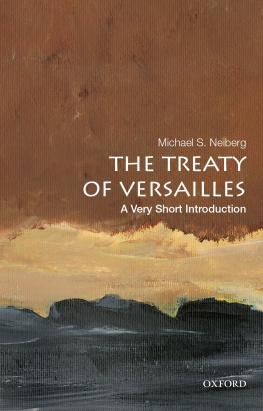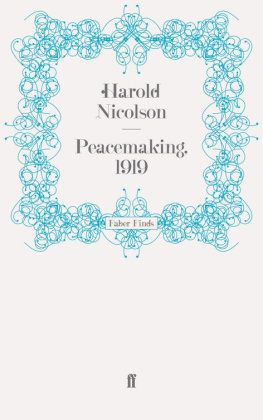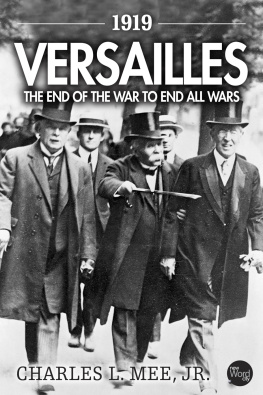Table of Contents
Praise for PARIS 1919
The history of the 1919 Paris peace talks following World War I is a blueprint of the political and social upheavals bedeviling the planet now.... A wealth of colorful detail and a concentration on the strange characters many of these statesmen were keep [Margaret MacMillans] narrative lively. The New York Times Book Review (Editors Choice)
Engrossing... Beautifully written, full of judgment and wisdom, Paris 1919 is a pleasure to read and vibrates with the passions of the early twentieth century and of ours. San Francisco Chronicle
So frequently do current events, particularly in the Balkans but also in the Middle East, take us back to the Paris Peace Conference that MacMillans book often reads like the commentary on the daily newspaper.... [MacMillan] captures the spirit of the enterprise brilliantly.... Her book has already won many prizes, and it deserves them all.
The Washington Post Book World
Fine and memorable... a revelation into the history of such trouble spots as the Balkans, the Middle East, and, especially, Iraq... MacMillan is a superb writer who can bring history to life.
The Philadelphia Inquirer
[A] rich stew of a book... MacMillan spices her account with vivid anecdotes and brightly drawn character sketches.
St. Louis Post-Dispatch
Excellent... This is a sprawling work of narrative political history, filled with both diplomatic detail and vivid portraits of statesmen from across the world who converged on Paris in those dreary early months of 1919.... By combining impeccable research with lively prose and an eye for telling detail, MacMillan brings the diplomatic wranglings to life.
Los Angeles Times Book Review
For anyone interested in knowing how historic mistakes can morph into later historic problems, this brilliant book is a must-read.
Fort Worth Star Telegram
[A] consistently compelling work... Paris 1919 is an amazingly detailed and wonderfully personal look at one of the most important peace conferences in modern history. The Atlanta Journal-Constitution
This is an enthralling book: detailed, fair, unfailingly lively.
The Daily Telegraph (London)
MacMillans scrupulously researched, very fluidly written and closely argued book forces us to reexamine our assumptions about the supposed myopia of Georges Clemenceau, David Lloyd George and Woodrow Wilson as they imposed their settlement on the defeated Central Powers and their allies. The Sunday Telegraph (London)
MARGARET MACMILLAN received her Ph.D. from Oxford University and is provost of Trinity College and professor of history at the University of Toronto. Her previous books include Women of the Raj, a selection of the Book-of-the-Month Club and the History Book Club, and Canada and NATO. Paris 1919, published in the United Kingdom as Peacemakers, won the Duff Cooper Prize, the Samuel Johnson Prize, and the PEN Hessell Tiltman Prize. Margaret MacMillan is the greatgranddaughter of David Lloyd George. She lives in Toronto.
To Eluned and Robert MacMillan
Foreword
Richard Holbrooke
In diplomacy, as in life itself, one often learns more from failures than from successes. Triumphs will seem, in retrospect, to be foreordained, a series of brilliant actions and decisions that may in fact have been lucky or inadvertent, whereas failures illuminate paths and pitfalls to be avoided in the parlance of modern bureaucrats, lessons learned. With this in mind, it is time to look again at what happened in Paris in 1919. Margaret MacMillans engrossing account of that seminal event contains some success stories, to be sure, but measured against the judgment of history and consequences, it is a study of flawed decisions with terrible consequences, many of which haunt us to this day.
In the headline version of history, the road from the Hall of Mirrors to the German invasion of Poland only twenty years later is usually presented as a straight line. But as MacMillan forcefully demonstrates, this widely accepted view of history distorts the nature of the decisions made in Paris and minimizes the importance of actions taken in the intervening years.
The manner in which the war endedwith an armistice and no fighting on German soilplayed a significant role in subsequent events. Things might have been different, MacMillan writes, if Germany had been more thoroughly defeated. Most Germans outside the High Command did not realize that Germany was finished militarily, and therefore did not regard November 11, 1918, as a day of surrender. Hitler would capitalize on this; his promise to undo the Treaty of Versailles was a potent and popular theme during his rise to power. But MacMillan corrects the widely held view that the reparations payments imposed by the victors were so onerous as to have caused the wreck of the German economy that paved the way for Hitler.
By any standard, the cast of characters that assembled in Paris in 1919 was remarkable, from Lawrence of Arabia to a small Vietnamese kitchen hand later known as Ho Chi Minh. And for the first time in history, an American stood at the center of a great world drama. Woodrow Wilson inspired tens of millions who never met him, and frustrated those who worked with him. He was idealistic and remote, nave and rigid, noble and conflicted. His strengths and weaknesses, his health, even the influence of his overbearing and ignorant wife, were all critical factors in events of historic importance.
In the eighty years since he left office, Wilsons reputation has risen and fallen regularlybut he remains as fascinating and central to an understanding of modern American foreign policy as ever. His many supporters, from Herbert Hoover to Robert McNamara, have argued that his enemies in both Paris and the United States Senate were responsible for the undoing of one of historys noblest dreams. Others, including Senator Jesse Helms, have viewed Wilsons determined adversary, Senator Henry Cabot Lodge, as a principled protector of American sovereignty and charged Wilson with seeking to undermine the American Constitution. Another school of thought, especially prevalent in the latter years of the Cold War, criticized Wilson for unrealistic, overly moralistic goals; among its best-known practitioners are George F. Kennan and Henry Kissinger, who accused Wilson of extraordinary conceit, even while conceding that he originated what would become the dominant intellectual school of American foreign policy. (To Kissingers horror, his president, Richard Nixon, placed Wilsons portrait in the place of honor in the Cabinet Room.)
Through the fog of this never-ending debate, one thing is clear: as Wilson arrived in France in December 1918, he ignited great hopes throughout the world with his stirring Fourteen Pointsespecially the groundbreaking concept of self-determination. Yet Wilson, often ill-informed or badly prepared for detailed negotiations, seemed vague as to what his own phrase actually meant. When I gave utterance to those words, he admitted later, I said them without the knowledge that nationalities existed, which are coming to us day after day.
Even at the time it was recognized that the concept of self-determination was, as MacMillan puts it, controversial and opaque. When the President talks of self-determination, Secretary of State Robert Lansing asked, what unit has he in mind? Does he mean a race, a territorial area, or a community?... It will raise hopes which can never be realized. It will, I fear, cost thousands of lives. In the end it is bound to be discredited, to be called the dream of an idealist who failed to realize the danger until it was too late.

